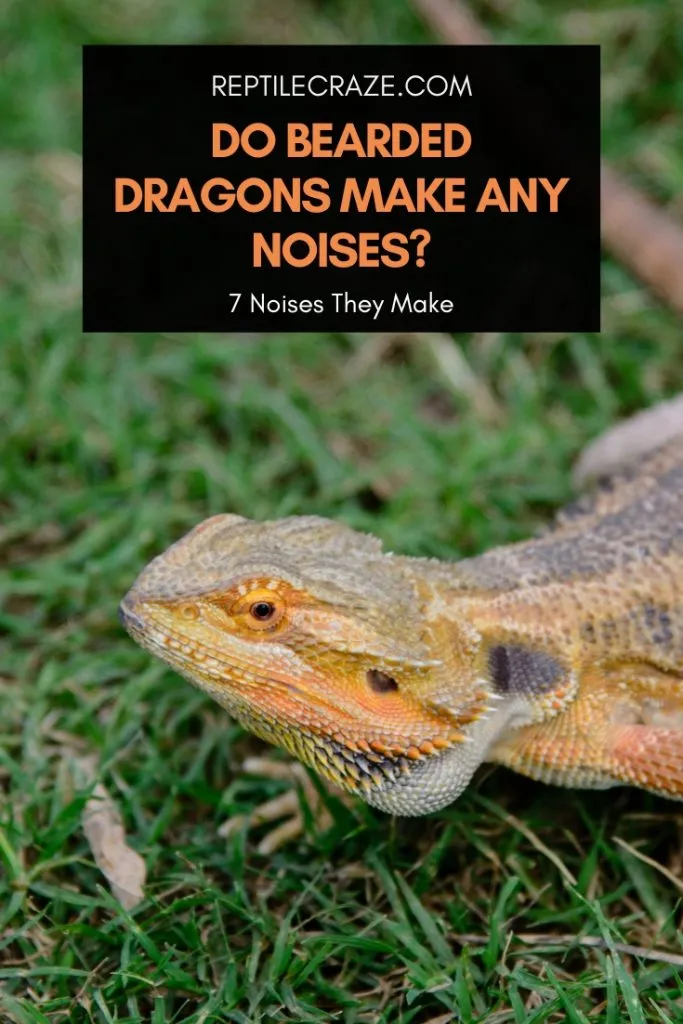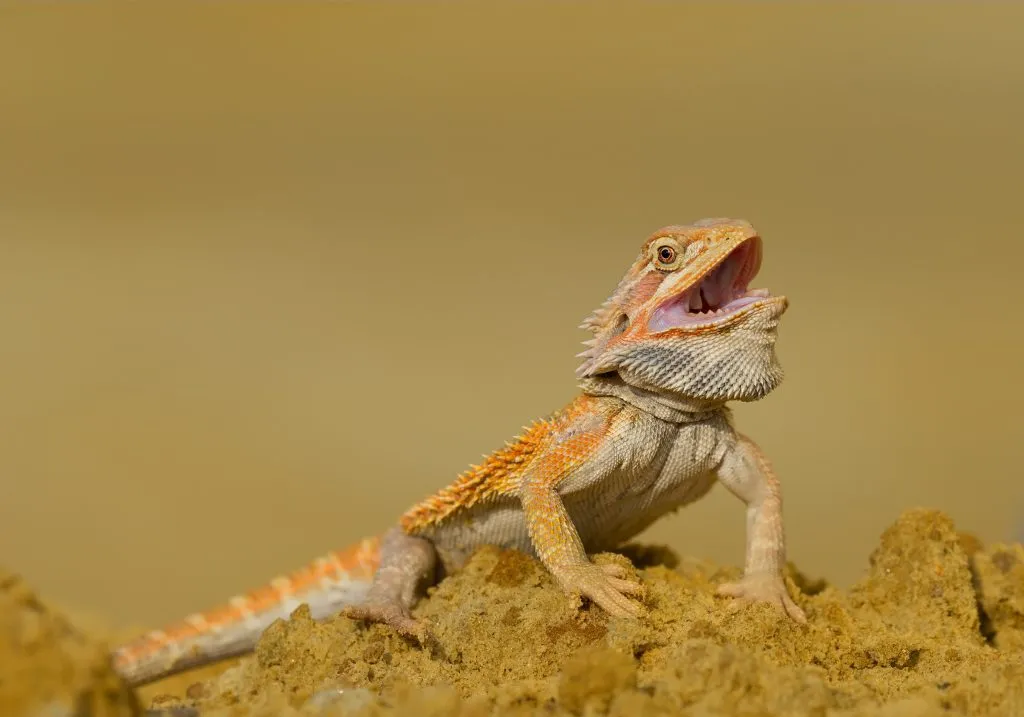
Do bearded dragons make noise? Will their noises keep you up at night? What is really cool about the noises that bearded dragons make is that they serve as signs of how they currently feel or if something is stressing them out.
Bearded dragons can make hissing, burping, whistling, rasping, and huffing noises. They can also make clicking noises due to glass surfing and digging behavior. In general, bearded dragons do not make a lot of noise as they use body language to communicate.
What are the normal and abnormal noises that bearded dragons make? In this article, we are going to discuss what a specific noise means as well as what they sound like. So keep on reading to learn more about your beardie!
Table of Contents
Do Bearded Dragons Make Noise?
Bearded dragons do not make loud noises as compared to mammals because they do not have vocal cords. Therefore, they rely on body language to communicate instead of making noise.
The noise that bearded dragons make is closely associated with breathing problems and respiratory infections.
If they do make other noises, this can be due to their claws rubbing against the glass when they dig or parts of their body hitting the glass when they are glass surfing.
Here are the noises that bearded dragons make:
1. Hissing
The hissing sound that you hear from your bearded dragon indicates that it is stressed, anxious, or it feels threatened.
This is one of the common sounds that you hear from them especially if you first got your beardie and it is not yet used to its enclosure and your presence.
During handling training, your bearded dragon may also hiss aggressively when it feels pushed. This sound also serves as a warning before they do a defensive bite.
They can also puff up while hissing and turn into a slightly darker color.
If you want to have a better feel as to why your beardie is making a certain noise, you should also be knowledgeable about why they keep their mouths open.
You can read this article to have a deeper understanding of why they open their mouths.
2. Burping
The burping sound of a bearded dragon is drastically different from the burping sound that humans are familiar with. In their case, it sounds more like they are preparing to vomit.
It is natural for bearded dragons to burp especially when they just finished eating. It simply means that they are trying to release the excess gas from their gut.
On the other hand, if it keeps burping too many times after eating or even hours after eating, it can be a sign of impaction.
When you see that there are also signs that your beardie is struggling to breathe while making the burping sound, you should immediately take it to the vet.
3. Whistling
This sound is not very common, but you can also hear a whistling noise from your bearded dragon.
You may think that it is not producing noise because you will see that its mouth is not open, but still, it is producing a sound, but the reason behind this is that the sound is coming from its nostrils.
This may be due to a lodged piece of skin that is stuck on its nostrils. So when it breathes, it makes a whistling sound. The same goes for a stuck piece of the substrate in the nostril.
In some cases where a bearded dragon is going through a respiratory infection, it can make a whistling noise while hanging its mouth wide open.
This can be due to excess mucus in the nostrils that makes it hard for it to breathe. This is the case in the video below.
4. Rasping
This sound is a huge sign that your bearded dragon is sick. It can be due to internal parasites, upper respiratory infection, or yellow fungus disease.
All of these pertain to problems with the enclosure such as built-up waste, the presence of mold, wrong temperature, and humidity settings.
5. Huffing
This sound is produced by the constant inhaling and exhaling of air. Usually, this happens when they are trying to completely ingest a meal. No need to worry as this is totally normal.
This sound is also characterized by the constant opening and closing of their mouth to let in and let out the air. This is the reason why this sound is often mistaken for coughing.
Keep in mind that coughing is the constant expelling of air. Compared to huffing, you can see an intake of air after exhaling.
In the video below, you can see how the beardies huff as a means to aid in eating. You cannot really hear the sound, but you can see when the beardies inhale and exhale.
Other Noises That Bearded Dragons Make
There are also other noises that bearded dragons make that do not come from them, but rather from interacting with their environment.
Glass Surfing Noises
Bearded dragons can scratch against the glass of their enclosure for a number of reasons. It may be because they saw something interesting outside, or they want to be let out, or they saw you and is excited to be fed.
This noise is not too loud but it can become annoying especially when your beardie decided to rub or drag parts of its body against the sides of the enclosure.
Digging Noises
Bearded dragons love to dig. They will constantly dig their substrate (if you provided them with a substrate that can be dug) and bury themselves in that area.
Therefore, if the substrate cannot be dug, the noise that they produce from their attempt to dig can be a bit loud.
You can also hear the noise of their flipping tails that may hit against something due to their frustration that they cannot dig.
Moral of the story? Just give your beardies a substrate that allows them to dig whenever they want.
Do Bearded Dragons Make Noise At Night?

They do not make any noise at night. So rest assured, they will not wake you from sleeping. They are also diurnal, so they are asleep during nighttime.
On the other hand, they can make slight noises at night when they are sick. If they have trouble breathing, they can do rasping and whistling noises. Both of which are not that loud.
Also read: Do beardies night light at night?
Why Is My Bearded Dragon Chirping?
It is highly unusual to hear a bearded dragon chirp. Not only do they not have vocal cords, but their bodies absolutely do not have anything that can produce that sound.
So where is the sound coming from?
The most likely culprit is the cricket feeder. If you leave live feeders in the enclosure (which is not recommended), they will certainly chirp away.
It is best to remove live feeders from the enclosure as they may harm your beardie while it is sleeping.
Why Is My Bearded Dragon Squeaking?
The squeaking noise can come from the nails of your bearded dragon when it is scratching against a glass or tile surface.
On the other hand, if you are absolutely sure that the squeaking noise is coming from it, it is possible that it is a rasping noise that is slightly pinched.
If this is the case, then your beardie may be suffering from a respiratory infection. Make sure to go to the vet just to rule out any suspicions.
Why Is My Bearded Dragon Gurgling?
If you hear a gurgling sound from your bearded dragon, then it certainly has a respiratory infection. Usually, you hear the gurgling sound, you will hear rasping first.
When left unattended without medical intervention, what used to be a rasping noise will now include a gurgling sound as your beardie is trying to breathe normally despite the mucus in its throat and nostrils.
The gurgling sound is produced by the passing of air with the mixture of saliva and mucus in the throat.
Conclusion
Bearded dragons do not have vocal cords which is why they rely on body language to communicate. The noises that we hear are tell-tale signs of stress, anxiety, threat, and sickness.
It is best to always observe the noises as well as their body language to figure out if there is something wrong with your bearded dragon.
- Enchi Ball Python: A Unique and Stunning Morph of Python regius - March 27, 2025
- Emerald Tree Monitor: The Enigmatic Green Guardian of the Rainforest - March 26, 2025
- The Egyptian Cobra (Naja haje): A Fascinating Serpent - March 25, 2025
